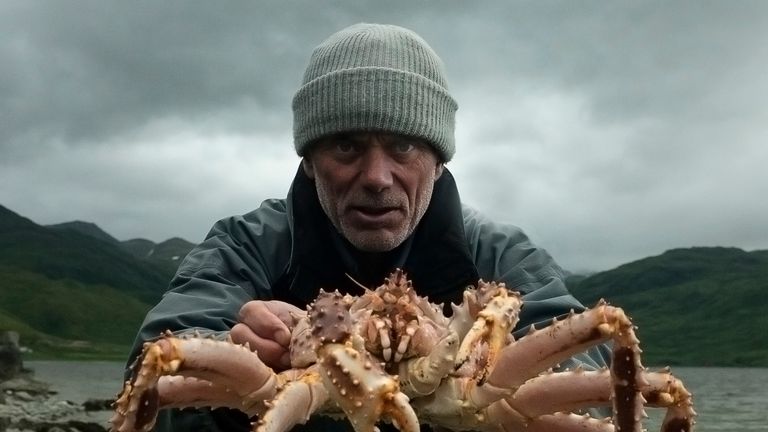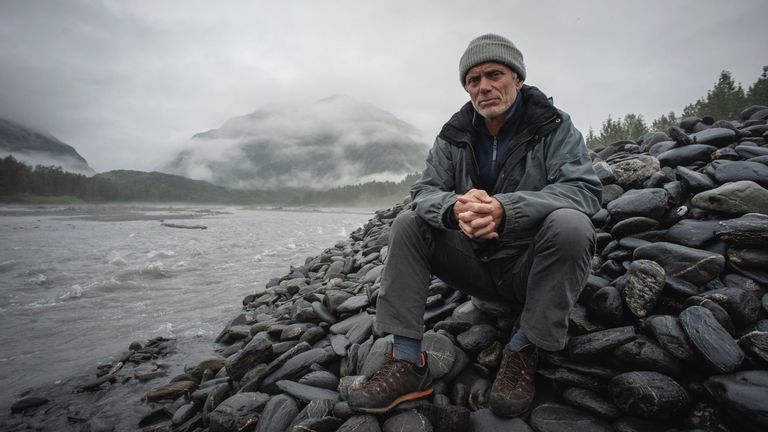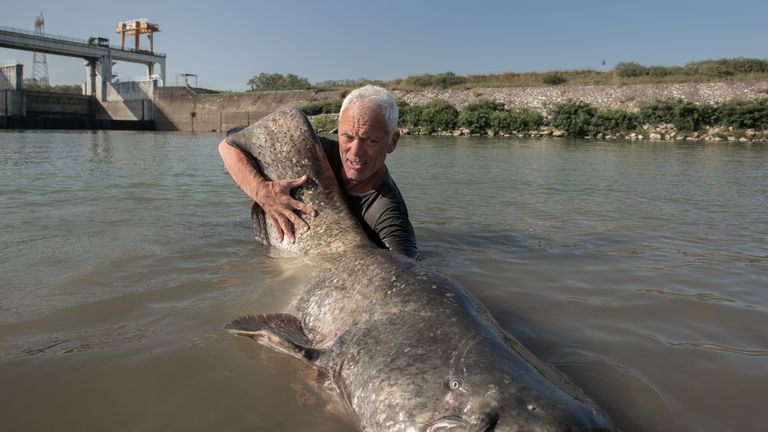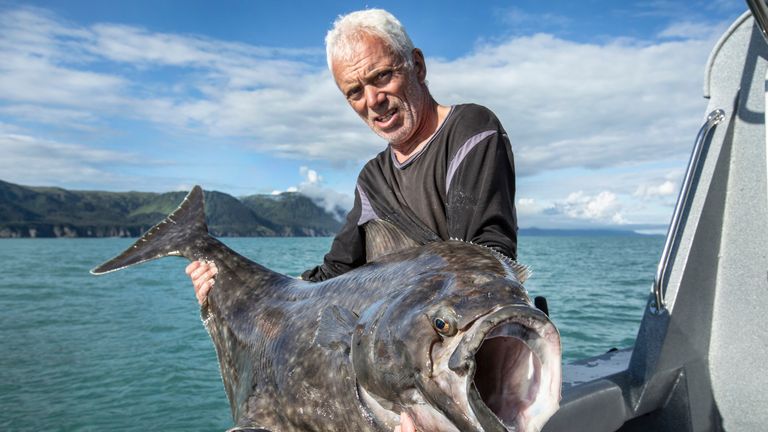Biologist Jeremy Wade is back with a new show, Dark Waters, after nine seasons of fan favourite River Monsters.
Here, we find out about his latest underwater mysteries, which see him travel all over the world – from Italy's Lake Garda to the Australian outback.
How is Dark Waters different to River Monsters?
It's still an investigation, it's still an underwater detective story, but River Monsters was more of a whodunnit. Somebody got their foot bitten or they got pulled in, something happened, and it was about asking, what was it that did that?
Over the years I kept hearing other stories as well. For example, people say there's a lake monster in Italy, in Lake Garda. People are saying that the king salmon in Alaska are for some reason not coming back from the sea. So what's going on? A story about a crayfish, a freshwater crayfish in Tasmania, which grows to the size of a dog and it will break your fingers – can that be for real? So it's sort of broadening out a bit from River Monsters.
Advertisement
They're all mysteries of one sort or another but a more sort of wide-ranging collection of mysteries.
RIver Monsters garnered something of a cult following, didn't it?
More from Ents & Arts
Absolutely. That surprised me for two reasons. First of all I'm surprised we managed to keep finding material, but the thing about fishermen's tales is that there is this inexhaustible supply out there.
I think we always set out to make it something a bit different. When it started it didn't fit into any established genre. It's a program about these weird fish that live in rivers that you don't normally see on TV. Why is that? The reason is most rivers, the water is not clear. So let's try and make a traditional wildlife film about this hideous catfish that lives in the mountain rivers of the Himalayas; you won't find it. You can't see it.
You have to do it differently, so my way is with a line, bringing it out. But also we didn't want it to be a conventional fishing show. We wanted to try and appeal to a wider audience.

There was this sort of detective element which I think as soon as you've got a crime scene, as soon as you've got a predator… we are all hard-wired to pay attention to predators, like with natural history programmes about lions ripping things apart. So here's a whole new class of predators.
I think part of that is there is a fascination with beautiful creatures, but there is also a fascination with ugly creatures. And if you live in muddy water, if nothing can see you, there's no point being good-looking. So a lot of these fish are not very good-looking. So there's fairly hideous-looking things down there but they have a certain fascination.
With River Monsters, I am the investigator: here's the crime scene, I talk to witnesses, I establish a suspects list, I narrow it down; here's the prime suspect, I go and arrest the prime suspect – who often doesn't want to come quietly.

The final twist is where I put the fish back in the water. Because if that fish bit somebody's foot, it's not the fish's fault it's the fault of the person for being in the wrong place at the wrong time, for not knowing that that fish was there, for not understanding its behaviour and so doing something stupid. We put the fish back and try and educate people.
There's almost this misunderstood monster. You know, it looks ugly and it's bitten somebody but actually there isn't any malice there, it's just doing what it does and it's up to us to understand it.
Do you ever worry you might find yourself in the wrong place at the wrong time?
Oh absolutely, all the time, and it's all about doing the homework. People say it a lot: 'Don't you get scared?' Actually, that's another theme of the program. It is about fear and fear is actually something very valuable, it's something which makes you pay attention.
In terms of fish, I haven't really come unstuck. I've been in situations where if I'd been careless I could have been missing some fingers or a hand or something like that, or a very, very bad bleed or whatever. But if you know what you're doing and you are focused you can avoid that.
It's when you're not paying attention, it's the other things. One River Monsters episode our sound recordist was hit by lightning, just something that came out of nowhere, literally a bolt from the blue. We'd been waiting for the weather to improve – 'oh great, the storm's moved, out we go' – and 'pow!'.
Any hairy moments filming this series?
We managed to get ourselves stranded… One of the places we filmed was the Aleutian Islands which sort of divide the Arctic Ocean from the Pacific. We were on a little island there and when we were due to be going out the weather closed in; very thick fog, not safe for flying. So there's a fairly dramatic bit of footage of us leaving the island.
Fish… let me see. I mean, I did have my hands inside the mouths of some toothy fish. One was actually big enough to get both hands in the jaw… if you do that in a halfhearted way and it moves it will completely shred your hands. So it's knowing what you're doing and doing your research in advance.

What about scariest moments ever?
I went to the Amazon and I was with a group of Amazonian fishermen and we are netting this fish called an arapaima, said by a lot of people to be the largest freshwater fish in the world. I was standing on the edge of the net and it hit me full in the chest. It was all over before I knew about it but I was literally sent flying backwards.
As arapaima go, it wasn't even a particularly big one – it was about five or six feet long and these things grow to nine or 10 feet – but still quite big. It was such a deep bruise that I could still feel it six weeks later. They have a very bony head, they've got a lot of muscle and the males will fight each other and they will kill each other. So that's how strong they are. After I'd been hit I was actually worried about, is this going to send my heart into some crazy life-threatening rhythm. So that was pretty scary. But I'm still here…
It's interesting because that's almost the boring answer. A lot of the fish I deal with do have a very real potential to cause damage, but if you know what you're doing then it's not going to happen. So for instance, I caught a 10ft bull shark up a river in South Africa that could have had half my arm off.
It's a bit like some martial arts: if you're behind somebody there's not much they can do, if you're in a certain position. So same thing with a fish, if you're in the right position you're okay. As soon as you get in the wrong position you can be in very real danger.
Any creatures that have eluded you? That you still want to find?
There was one fish in India called a sareng, which is a type of catfish, and that was about the only episode I think where I didn't get it… because there is tremendous pressure, we tend to have three weeks to film and we need a result. This particular fish, it didn't happen.
Fishermen can be very superstitious and sometimes you do find yourself thinking, this fish has got a curse on it, it's just not going to happen. So that was unfinished business. I eventually went and caught the same fish in Malaysia; there was a return match and things went my way that time.

There is much being done to highlight the problem of pollution in our oceans and rivers now – are you seeing the effects?
Very, very much so. We did a series, Mighty Rivers, last year which was looking at all the problems which affect rivers. In rivers it tends to be microRead More – Source
[contf] [contfnew] 
Sky News
[contfnewc] [contfnewc]







